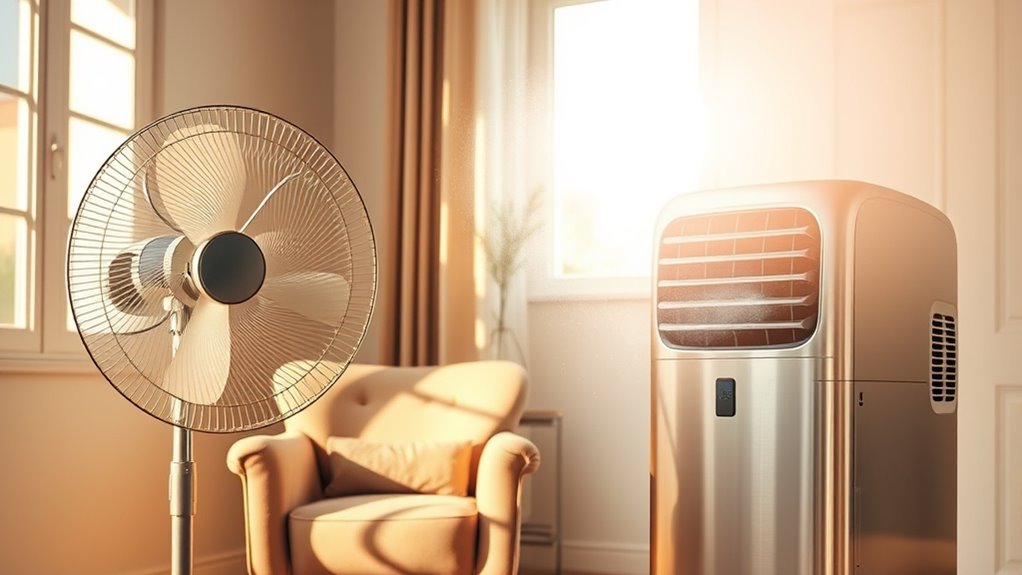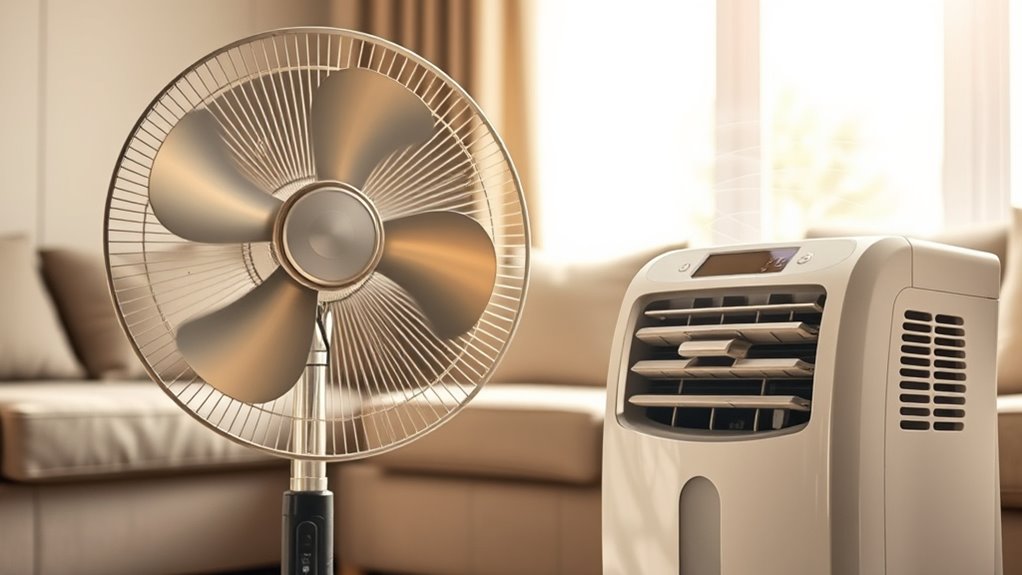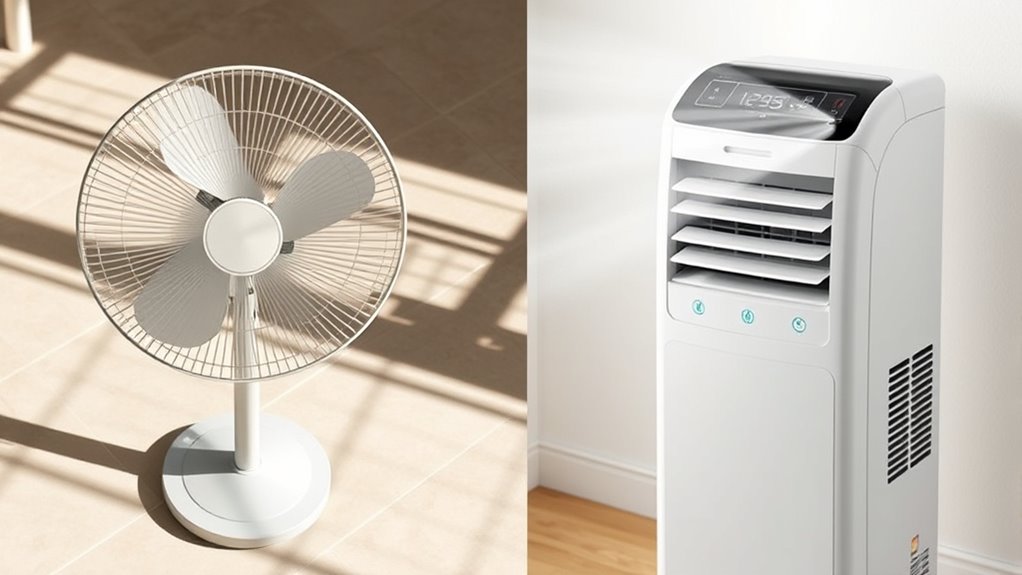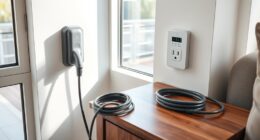Fans use less energy and are cost-effective, mainly circulating air without lowering temperature, making them ideal for quick comfort and humid conditions. Standalone cooling systems like air conditioners actively reduce indoor temperature and humidity, providing stronger climate control but at higher energy costs. Fans are less effective above 95°F and in damp environments, while air conditioning suits extreme heat and humidity better. Curious how to choose the best option? Keep exploring to find out more.
Key Takeaways
- Fans are highly energy-efficient and cost-effective, consuming significantly less power than standalone air conditioning units.
- Air conditioning provides more effective and rapid temperature reduction, especially in extreme heat or high humidity.
- Fans primarily circulate air for immediate relief but do not lower indoor temperatures or humidity levels.
- Standalone cooling systems like AC units offer consistent climate control and zone-specific comfort.
- Fans are suitable for mild conditions and quick airflow, while AC systems are essential for extreme heat and humidity management.
How Fans and Air Conditioners Keep You Cool

Fans and air conditioners keep you cool by removing heat from your surroundings in different ways. Fans work by increasing moisture evaporation from your skin, which absorbs heat and creates a cooling sensation. They don’t change the overall room temperature or humidity, only affecting you directly. In contrast, air conditioning cools the entire room by circulating coolant through evaporation and condensation cycles. This process lowers both the air temperature and humidity, making the environment more comfortable. Fans are energy-efficient but only provide localized relief, while air conditioners actively reduce ambient temperature and moisture for a more consistent cooling experience. Choosing the right system also depends on the type of cooling system and its specific features, such as energy consumption and capacity. Understanding these differences helps you choose the right system based on your needs, comfort preferences, and energy considerations.
Cost and Energy Efficiency of Cooling Options

When choosing between cooling options, understanding their cost and energy efficiency can help you save money and reduce your environmental impact. Fans use around 1% of the electricity that air conditioners do, making them highly energy-efficient. Running a fan continuously for 24 hours consumes less energy than just 15 minutes of air conditioning, highlighting their low energy consumption. Using fans can cut your overall energy costs by allowing you to set higher thermostat temperatures on your AC, which is the best cooling solution for minimizing electricity bills. Modern fans like the Vornado 660 maximize cooling power with minimal energy use, further boosting efficiency. Additionally, energy-efficient appliances can further enhance your savings and reduce your carbon footprint over time. Incorporating energy-efficient fans can provide even greater savings while maintaining comfort. Fans are particularly effective for small to medium-sized spaces, making them a practical choice for many households. Moreover, choosing fans with energy-saving features can optimize your energy consumption and provide long-term benefits. While air conditioners are more effective for large spaces or high temperatures, fans are a more economical and energy-efficient cooling choice for everyday cooling needs.
Limitations and Best Uses for Fans

Fans become less effective above 95°F because they can increase dehydration and reduce sweat evaporation, which may cause discomfort or health issues. On humid days, their ability to cool feels weaker since sweat doesn’t evaporate as well, making it seem hotter. Keep in mind, fans don’t lower humidity, so in damp conditions, they might make the heat feel worse. Additionally, engine tuning can optimize cooling systems for better performance in high temperatures. Incorporating sound healing techniques into your environment can also promote relaxation and help manage heat-related stress.
Dehydration Risks Above 95°F
Above 95°F, using fans can be risky because they accelerate moisture loss from your body, increasing the chance of dehydration and electrolyte imbalance. At high temperatures, fans cause rapid evaporation of sweat, which can lead to dehydration if you don’t maintain proper hydration. This heightened moisture loss raises the risk of heat exhaustion and other heat-related illnesses. While fans may initially feel cooling, they can make you feel hotter over time by depleting your body’s fluids. In extreme heat, their effectiveness diminishes, and relying solely on fans can be counterproductive. To prevent dehydration, it’s safer to limit fan use above 95°F and seek alternative cooling methods, like air conditioning, that help maintain hydration and reduce electrolyte imbalances. Additionally, proper hydration is crucial when exposed to high temperatures to offset fluid loss. Staying aware of heat-related health risks can help you take timely action. Recognizing symptoms of dehydration early can help prevent more serious health issues in hot conditions. It is also important to understand how body temperature regulation works to stay safe in extreme heat. Incorporating methods such as hydrotherapy techniques can provide additional relief and cooling in these conditions.
Limited Humidity Control
While fans can provide immediate relief in dry conditions, they have significant limitations when it comes to controlling indoor humidity. Fans don’t reduce moisture levels, so during humid days, sweat evaporation slows, making you feel hotter and less comfortable. Relying solely on fans can even cause dehydration and electrolyte imbalances as your body loses moisture. Fans are most effective when humidity is low, as they help evaporate moisture from your skin for cooling. But in high humidity, their effectiveness drops. To improve comfort, consider combining fans with dehumidifiers or air conditioning. Visualize:
- Humid air clinging to your skin
- Sweat feeling sticky and slow to evaporate
- Fans circulating damp, muggy air
- Increased dehydration risks
- Better relief with humidity control devices
When to Choose Air Conditioning

You should consider choosing air conditioning when outdoor temperatures surpass 95°F or during particularly humid days, as fans alone often can’t keep up with the heat. An air conditioning system provides a stronger cooling effect by actively removing heat and moisture from the air. Modern units, like energy-efficient models, help reduce energy costs while maintaining comfort. The HVAC system circulates hot gas to absorb heat, which is then expelled outside, ensuring consistent indoor temperatures. In high humidity, air conditioning reduces moisture levels, making indoor spaces more comfortable and preventing excess dampness. Additionally, advanced heat pump technology can be an energy-efficient alternative in moderate climates, offering both heating and cooling capabilities. When heatwaves hit or temperatures soar, an AC unit offers more reliable, extensive cooling than fans alone. This makes air conditioning the best choice for staying cool and comfortable during extreme weather conditions. Furthermore, integrating smart thermostat systems can optimize energy use and enhance user comfort. Proper ventilation also plays a key role in maintaining indoor air quality and comfort levels.
Comparing Climate Control Capabilities and Benefits

When it comes to controlling your indoor climate, air conditioning systems offer quick, precise adjustments across entire rooms or zones, unlike fans that only move existing air. Central and multi-zone units maintain consistent temperatures throughout large spaces, providing superior comfort. In challenging conditions like high humidity or extreme heat, air conditioning outperforms fans by effectively reducing both temperature and moisture levels. Additionally, air conditioners can improve indoor air quality by filtering out pollutants and reducing humidity, making the environment healthier. Incorporating smart technology allows these systems to adapt to usage patterns, further enhancing their efficiency and user convenience. Moreover, modern units often feature automatic temperature regulation, ensuring optimal comfort without manual adjustments. Proper maintenance and cleaning of the units also play a vital role in maintaining their performance and longevity.
Whole-House Climate Control
Have you ever wondered how whole-house climate control systems compare to other cooling options? With a whole-house setup, you get all-encompassing climate control that cools your entire home evenly. Think of it as a synchronized system that:
- Uses central air conditioning for uniform comfort
- Operates outdoor compressors and indoor air handlers
- Actively removes heat and moisture for consistent indoor air quality
- Incorporates zone control for customized comfort in different areas
- Is energy-efficient, saving you money during peak heat
Unlike portable fans or room units, whole-house systems create a stable environment regardless of weather extremes. Proper sealing and zone control further enhance efficiency, ensuring comfort and cost savings. This makes whole-house climate control a superior choice for maintaining a consistent indoor climate.
Rapid Temperature Adjustment
Air conditioning systems excel at rapidly lowering indoor temperatures, often reducing the air by 15-20°F within minutes. This rapid cooling is due to their high cooling capacity and ability to actively remove heat from the air. Air conditioners can quickly achieve comfortable indoor conditions, especially in high temperatures above 95°F. Unlike fans, which primarily circulate existing air and provide immediate airflow through adjustable fan speeds, they don’t considerably change room temperature. Advanced climate control systems with zoning and programmable thermostats allow for precise and rapid temperature adjustments, ensuring energy-efficient cooling. While fans offer quick relief through airflow, air conditioners deliver substantial temperature reductions swiftly, making them ideal for rapid temperature adjustment and maintaining consistent comfort.
Energy Consumption and Practical Considerations

Efficient cooling depends heavily on understanding energy consumption and making practical choices. Fans are highly energy-efficient, using about 50-100 watts per hour, compared to air conditioning’s 3,000-3,500 watts. Running a fan for 24 hours uses less energy than just 15 minutes of AC, leading to significant cost savings. By using fans strategically, you can set your air conditioner thermostat higher, reducing overall power usage. Proper use of fan-only modes and circulation can cut cooling costs further and lessen environmental impact. Imagine this:
- Fans quietly circulating air all day
- Air conditioners running intermittently
- Lower electricity bills from smart usage
- Reduced environmental footprint
- Improved energy efficiency at home
These choices help you optimize energy consumption and practical cooling strategies.
Frequently Asked Questions
Which Is Better, a Cooling Fan or a Cooler?
When deciding between a cooling fan and a cooler, think about your climate and comfort needs. Fans are energy-efficient and good for moderate heat, but they don’t lower the room temperature. Coolers actively cool the air, making them better for hot, dry environments. If you want effective cooling and humidity control, go for a cooler. For energy savings and basic airflow, a fan might be enough.
What Is the Disadvantage of a Cooling Fan?
Did you know that fans only circulate air and don’t lower the actual room temperature? The main disadvantage is that they can’t cool a space, which means you might still feel hot and uncomfortable. In high humidity or temperatures above 95°F, fans become less effective and can even cause dehydration by increasing moisture evaporation from your skin. Relying solely on fans might leave you feeling sweaty without real relief.
Is It Better to Use Fans or Air Conditioning?
When deciding between fans and air conditioning, consider your comfort needs and environment. Fans are more energy-efficient and cost less, ideal for mild temperatures and low humidity. However, if you’re in extreme heat or high humidity, air conditioning provides better cooling and humidity control. You might use fans to save energy and lower your AC costs, but in severe conditions, AC offers more reliable relief.
Is a Cooling Fan Better Than a Regular Fan?
A cooling fan is better than a regular fan because it actively promotes air circulation and moisture evaporation, making you feel cooler more quickly. It often has adjustable settings and features like oscillation or misting, which enhance its effectiveness. Unlike a standard fan, it can lower the actual room temperature and is more energy-efficient, making it a smarter choice for comfortable, cost-effective cooling.
Conclusion
Choosing between fans and air conditioners is like selecting a spark or a blaze—you get the right heat for the moment. Fans are your breezy companions for quick relief, while ACs are the mighty engines that tame the hottest days. Think of fans as gentle whispers and air conditioners as roaring dragons. Pick wisely, and you’ll keep your cool without burning out your wallet or energy. Your perfect climate control is just a decision away—make it count!









